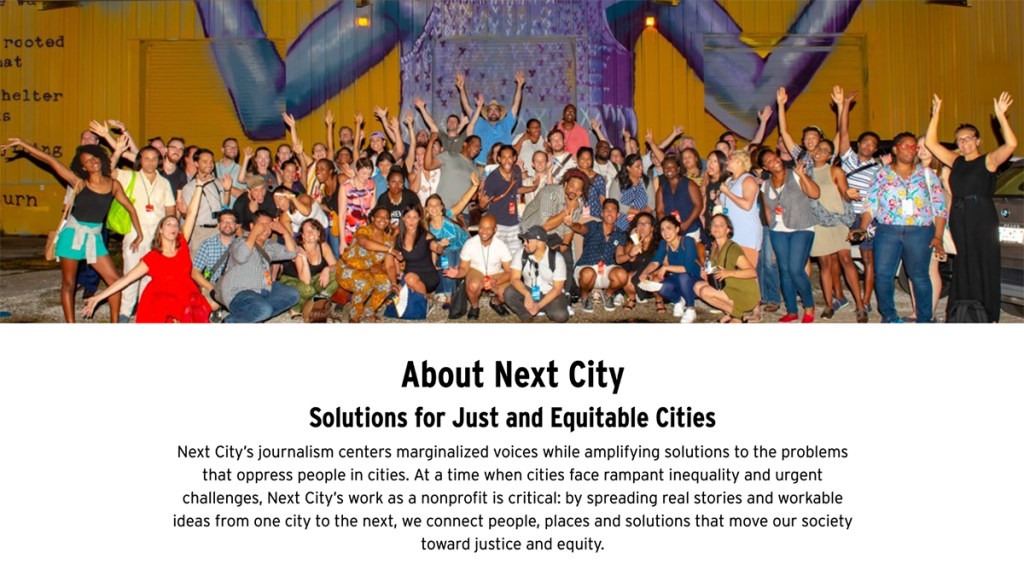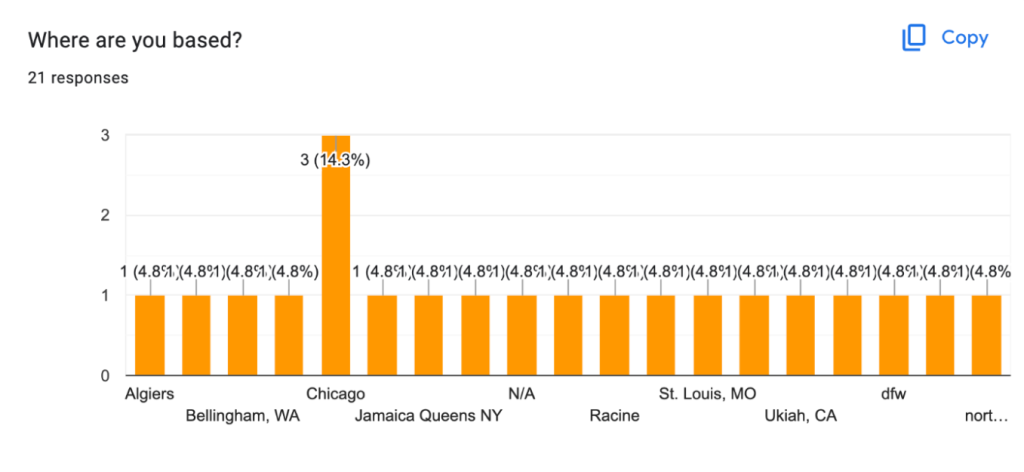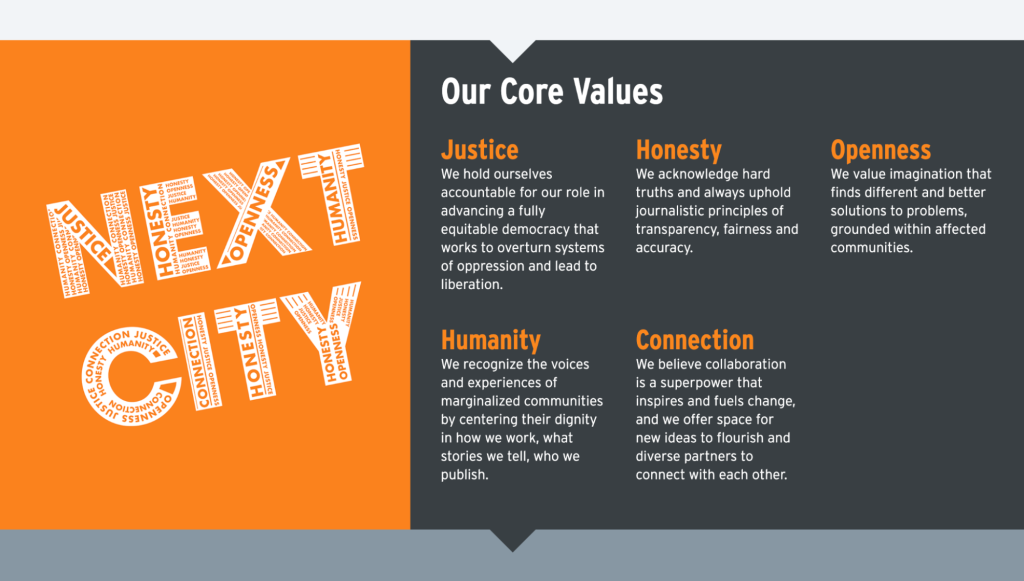
Understanding and communicating impact
How we analyzed our reader survey and used the results to tell our story at Next City
Audrey Novinger is a 2024 RJI Student Innovation Fellow partnered with Next City. The RJI Student Fellows will be sharing their innovative work throughout the summer in Innovation in Focus.
When we first began gathering impact stories from readers this summer at Next City, we reached out to other nonprofit newsrooms to ask about their impact collection methods. We found that each of these newsrooms defined and tracked impact in ways that aligned with their organization’s goals and characteristics. Factors like newsroom size, target audience, location, and coverage topics influenced each newsroom’s unique understanding of impact.
Data from Next City’s 2020 reader survey and our recent Google Form reader survey show that Next City is reaching people in cities and providing them with tools to create meaningful change. Next City provides examples of its impact on its “About” page and under its Strategic Plan.
And we want to deepen our understanding of our work’s societal effects and refine our framework for identifying, measuring and communicating our impact. To do this, we outlined the steps we are taking based on the results from our most recent reader survey.
STEP 1: Identify or revisit organizational mission, goals and audience
Before we conducted our reader survey, we reacquainted ourselves with Next City’s mission, values and audience. Next City’s mission is to provide communities and leaders with solutions-based journalism about problems that oppress people in cities by centering diverse perspectives and amplifying marginalized narratives. Next City’s mission statement identifies communities and community leaders in cities as the primary audience impacted by its journalism. In our most recent project to collect impact stories, we surveyed readers by asking how they used Next City for their work. The responses we gained highlighted how people across multiple cities and occupations are using Next City to affect urban policy and inform their practices. Given that readers’ stories serve as primary examples of how Next City’s work is being applied, our framework for identifying and communicating impact started with analyzing our reader data.
STEP 2: Analyze the results from the reader survey and begin to flag examples of impact
In our first project, we sent a Google Form survey to readers via our social media accounts and newsletter. Over the course of a couple weeks, we received 22 responses from readers located in cities across the U.S. Our readers come from the East and West Coasts as well as the Midwest. Respondents also identified across a wide range of fields and occupations, suggesting that the topics we cover are relevant to a broad population.
Some of our respondents’ occupations include:
- Climate Resilience Program Manager
- Community Research and Innovation Associate
- Blogger
- CEOs, presidents, executive directors, and co-founders of organizations
- Unemployed, interested in political newsletters
- Public Engagement Manager
- Research and Policy Manager
- Nonprofit and Community Outreach Lead
- University professor
Our respondents are based in cities such as:
- Chicago (our top response)
- St. Louis, MO
- Racine, WI
- Jamaica, Queens, NY
- Bellingham, WA
- Ukiah, CA

We also asked our readers how they use Next City in their work and personal lives. Here are some examples they shared:
- Cite Next City’s journalism in their blogs, newsletters, and publications
- Use Next City’s reporting to inform best practices in their workplaces
- Share Next City’s stories with colleagues, city leaders, and students
- Reference Next City to stay informed about urban policy and community empowerment
- Sign up for webinars and workshops
- Seek inspiration for projects
In our final question, we asked readers how Next City can improve its journalism to better serve their communities. Our readers responded with ideas for improvement and examples of what we are doing well. Here are a few suggestions from our readers:
- Several readers mentioned that they would like to see more actionable steps they can follow to create change.
- Several readers said they would like to see more content that focuses on smaller cities outside the East Coast and less urban areas.
- One reader said they are interested in articles that discuss the challenges of creating change and ways to overcome obstacles.
- Several respondents applauded Next City for their work, and one respondent said Next City covers topics that are relevant to them.
Survey takeaways
The 22 readers who responded to our survey provided useful information about Next City’s reach and relevance. Next City’s work is cited by people across a range of professions and is even used in educational spaces. For several readers, Next City is their go-to source for staying informed about urban policy. The publication’s work is reaching its target audience, as city planners and people invested in creating change report sharing, referencing, and utilizing its journalism.
The responses we received also helped us identify areas for improvement. Several readers from locations outside the East Coast are interested in more stories that pertain to their cities. Next City’s work has been well-received by its current reader base, so one possibility moving forward is to report more stories on different geographic regions.
STEP 3: Continue to collect data and develop a plan to communicate findings.
Our impact survey helped us identify Next City’s strengths and provided us with strong examples of how the news outlet is making a difference. Before we began our first RJI impact project, Next City did not have many examples of how its readers use its journalism in their work. We now have 22 responses that we can follow-up with for more information and for permission to use quotes in our impact presentations. Next City’s team also began using Slack as a result of our RJI projects to keep track of impact-related materials as well as examples of other news organizations’ impact pages. In the future, Next City may create an impact page on its website, so having easily accessible examples in Slack (plus the newsroom interviews we conducted in our first project!) detailing how other nonprofit media outlets design and prioritize their impact data will help Next City’s team effectively communicate its findings. We want to make sure our hard work to collect stories can be presented to donors, shared in our newsletter, and highlighted on our website. Here are the next steps we will take to communicate our impact:
- Request permission from survey respondents to share quotes and personal stories in our reports with donors and on public spaces like social media and our website.
- Reference Next City’s Strategic Plan, which outlines how it will create change and why solutions to urban problems are necessary. By referencing this plan, we can communicate our findings in ways that reflect our core values and resonate with our audience.

- Use Slack to document impact examples, flag examples from other news outlets, and encourage our staff to think regularly about impact
- Reach out to institutional members and other people who use Next City’s work but who may not have been explicitly targeted in our previous surveys.
- Continue to share our impact survey on an annual basis across social media and in our newsletter.
Cite this article
Novinger, Audrey (2024, Aug. 9). Understanding and communicating impact. Reynolds Journalism Institute. Retrieved from: https://rjionline.org/news/understanding-and-communicating-impact/
